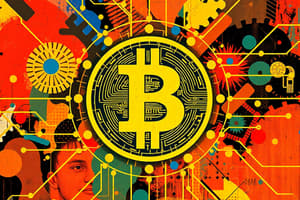Podcast
Questions and Answers
Which of the following best describes the primary function of sensors in the Internet of Things (IoT)?
Which of the following best describes the primary function of sensors in the Internet of Things (IoT)?
- To collect data from the environment. (correct)
- To process data and make decisions based on it.
- To enhance data security among connected devices.
- To provide connectivity for the devices through local networks.
What is a significant trend in the development of biopharmaceuticals?
What is a significant trend in the development of biopharmaceuticals?
- Personalized medicine based on genetic profiles. (correct)
- Decreased ethical considerations in gene editing.
- Focus on traditional chemical synthesis methods.
- Reduction in the use of synthetic biology.
In the context of IoT, what does edge computing primarily facilitate?
In the context of IoT, what does edge computing primarily facilitate?
- Real-time data processing close to the data source. (correct)
- Increased latency in data transmission.
- Data storage in a central cloud location.
- Reduced energy consumption of connected devices.
What ethical concern is associated with advancements in biotechnology?
What ethical concern is associated with advancements in biotechnology?
How does the integration of AI enhance the Internet of Things (IoT)?
How does the integration of AI enhance the Internet of Things (IoT)?
What is a primary application of Machine Learning in the field of Artificial Intelligence?
What is a primary application of Machine Learning in the field of Artificial Intelligence?
Which feature of Blockchain technology ensures that once information is recorded, it cannot be altered?
Which feature of Blockchain technology ensures that once information is recorded, it cannot be altered?
Which technology is primarily used for converting sunlight into electricity?
Which technology is primarily used for converting sunlight into electricity?
Which area does Genetic Engineering focus on within Biotechnology?
Which area does Genetic Engineering focus on within Biotechnology?
What is a significant trend in Renewable Energy Technologies?
What is a significant trend in Renewable Energy Technologies?
In the context of Artificial Intelligence, what is Natural Language Processing primarily used for?
In the context of Artificial Intelligence, what is Natural Language Processing primarily used for?
Which of the following technologies utilizes cryptographic techniques to ensure data security?
Which of the following technologies utilizes cryptographic techniques to ensure data security?
Which revolutionary gene-editing tool allows precise modifications in organisms?
Which revolutionary gene-editing tool allows precise modifications in organisms?
Flashcards are hidden until you start studying
Study Notes
Technological Innovations
Artificial Intelligence (AI)
- Definition: Simulation of human intelligence processes by machines, especially computer systems.
- Key Applications:
- Natural Language Processing (NLP) for human-computer interaction.
- Machine Learning (ML) for predictive analytics and data processing.
- Robotics for automation in manufacturing and service industries.
- Trends:
- Increased use in personalized medicine and healthcare diagnostics.
- AI ethics and governance discussions focusing on bias and accountability.
Blockchain Technology
- Definition: A decentralized digital ledger that records transactions across multiple computers.
- Key Features:
- Transparency: All participants can access the same information.
- Immutability: Once recorded, information cannot be altered retroactively.
- Security: Cryptographic techniques prevent unauthorized access.
- Applications:
- Cryptocurrencies (e.g., Bitcoin, Ethereum).
- Supply chain management for tracking product provenance.
- Smart contracts for automated, trustless agreements.
Renewable Energy Technologies
- Definition: Technologies that harness energy from renewable sources such as solar, wind, and hydro.
- Key Types:
- Solar Power: Photovoltaic cells convert sunlight into electricity.
- Wind Energy: Turbines convert wind energy into electricity.
- Hydropower: Energy generated from flowing water.
- Trends:
- Advancements in energy storage solutions (e.g., batteries).
- Integration of renewable energy into smart grids for efficiency.
- Policy shifts promoting sustainability and reducing carbon footprints.
Biotechnology Advancements
- Definition: Use of biological processes for industrial and medical applications.
- Key Areas:
- Genetic Engineering: Modification of organisms' DNA for desired traits.
- CRISPR Technology: A revolutionary gene-editing tool that allows precise modifications.
- Biopharmaceuticals: Development of therapies derived from biological sources.
- Trends:
- Personalized medicine based on genetic profiles.
- Innovations in agricultural biotechnology to enhance crop yields.
- Ethical considerations surrounding gene editing and synthetic biology.
Internet of Things (IoT)
- Definition: Network of interconnected devices that collect and exchange data.
- Key Components:
- Sensors: Collect data from the environment.
- Connectivity: Devices communicate via the internet or local networks.
- Data Processing: Analyzing data to make informed decisions.
- Applications:
- Smart homes (e.g., thermostats, security systems).
- Industrial IoT (IIoT) for optimizing manufacturing processes.
- Health monitoring systems for tracking patient data remotely.
- Trends:
- Growth of edge computing for real-time data processing.
- Increased focus on cybersecurity for IoT devices.
- Integration with AI for smarter decision-making capabilities.
Artificial Intelligence (AI)
- Simulation of human intelligence processes by machines, significantly enhancing capabilities in various sectors.
- Key applications include Natural Language Processing (NLP) for improving human-computer interaction.
- Machine Learning (ML) is utilized for predictive analytics and effective data processing.
- Robotics plays a vital role in automating tasks across manufacturing and service industries.
- Current trends highlight increased use of AI in personalized medicine and healthcare diagnostics.
- Ethical discussions on AI focus on issues of bias, accountability, and governance.
Blockchain Technology
- Serves as a decentralized digital ledger that securely records transactions across multiple computers.
- Key features include transparency, allowing all participants access to the same information.
- Immutability ensures information cannot be altered retroactively, enhancing trust among users.
- Cryptographic techniques provide robust security measures against unauthorized access.
- Applications are seen in cryptocurrencies like Bitcoin and Ethereum, revolutionizing financial transactions.
- Used in supply chain management for tracking the provenance of products.
- Smart contracts enable automated agreements without the need for intermediaries.
Renewable Energy Technologies
- Harness energy from renewable sources such as solar, wind, and hydro, promoting sustainability.
- Solar power utilizes photovoltaic cells, converting sunlight directly into electricity.
- Wind energy is generated through turbines that convert wind motion into electric power.
- Hydropower focuses on energy derived from flowing water, contributing significantly to energy solutions.
- Recent trends include advancements in energy storage technologies, particularly batteries.
- Integration into smart grids enhances efficiency and energy management.
- Policy initiatives are encouraging a shift toward sustainability and reducing carbon footprints.
Biotechnology Advancements
- Involves the use of biological processes for innovations in industrial and medical fields.
- Genetic engineering allows for the modification of organisms' DNA to express desired traits.
- CRISPR technology represents a groundbreaking gene-editing tool enabling precise genetic alterations.
- Biopharmaceuticals developed from biological sources are transforming therapeutic approaches.
- Current trends emphasize personalized medicine tailored to individual genetic profiles.
- Innovations in agricultural biotechnology aim to enhance crop yields and food security.
- Ethical considerations regarding gene editing and synthetic biology are gaining importance.
Internet of Things (IoT)
- Represents a network of interconnected devices that gather and exchange data, enhancing connectivity.
- Key components include sensors that collect environmental data for analysis.
- Connectivity allows devices to communicate via the internet or local networks for data sharing.
- Data processing is crucial for making informed, immediate decisions based on collected data.
- Applications encompass smart homes, including smart thermostats and security systems.
- Industrial IoT (IIoT) optimizes manufacturing processes through real-time data insights.
- Health monitoring systems enable remote tracking of patient data for better healthcare management.
- Trends indicate growth in edge computing, focusing on real-time data processing capabilities.
- Increasing emphasis on the cybersecurity of IoT devices to protect against vulnerabilities.
- Integration with AI enhances decision-making processes and operational efficiency.
Studying That Suits You
Use AI to generate personalized quizzes and flashcards to suit your learning preferences.




